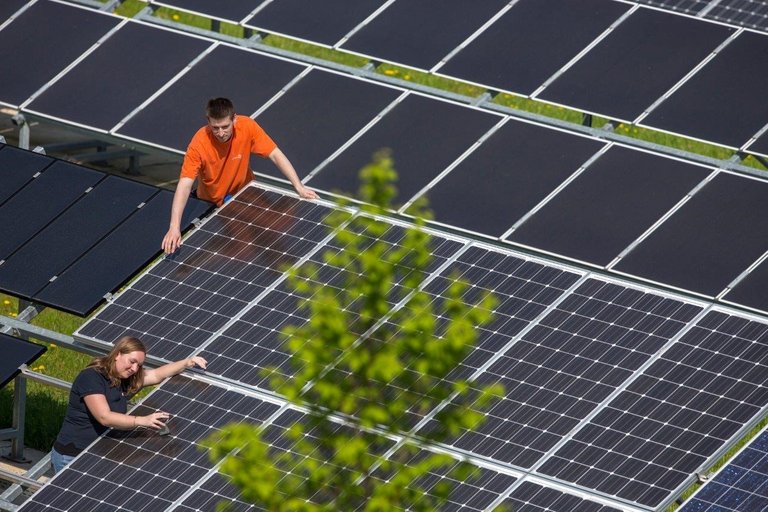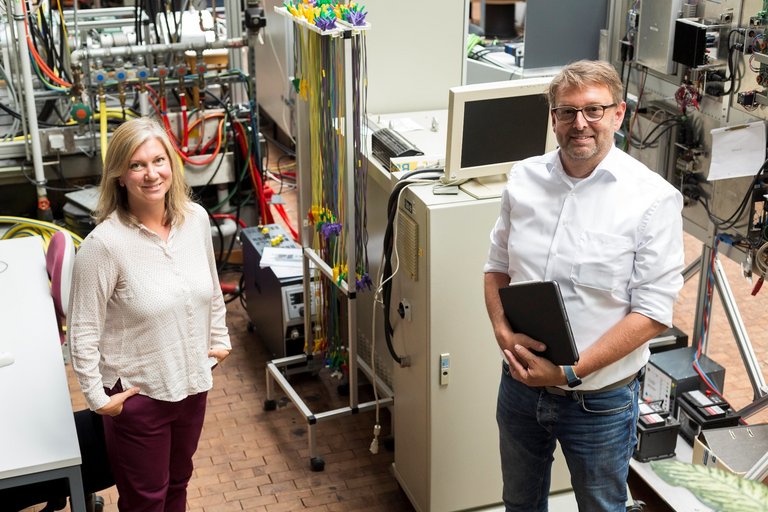Energia Connecticum 2023 will be held at TU Ilmenau from March 9 to 10, 2023. Experts from the energy industry and science as well as students and members of the university are invited to exchange ideas on current energy issues across disciplinary boundaries at the scientific colloquium of the Thuringian Energy Research Institute (ThEFI). This year, the focus of the two-day event is on "Power Grids of the Future." We spoke with the host of the colloquium, ThEFI Director and Head of the Power Systems Group at the TU Ilmenau, Prof. Dirk Westermann, about the most pressing issues of the energy transition and the current state of research on power grids.

The transformation of our energy system away from nuclear and fossil fuels toward renewables and greater energy efficiency requires the development of new, economically viable and fail-safe technologies on an unprecedented scale - and within a very short time. Where do we currently stand? And what still needs to be done? Experts from Thuringia and Germany will be discussing these questions at Energia Connecticum.
Cross-thematic presentations by Prof. Dr. Stefan Niessen, Head of Technology Field Sustainable Energy & Infrastructure at Siemens Technology and Professor at TU Darmstadt for Technology and Economics of Multimodal Energy Systems, and Dr. Hartwig Stammberger from Eaton Industries GmbH will provide an overview of the current status and potential of research in this field. In his keynote speech, Carsten Feller, Thuringian State Secretary in the Ministry of Economics, Science and Digital Society, will illustrate in particular the importance of the topic for Thuringia as a location for technology and science. In poster sessions and pitches, scientists from TU Ilmenau will also present their PhD projects at ThEFI, the Thuringian Energy Research Institute, which is headed by Prof. Dirk Westermann.
Prof. Westermann, with the growing share of renewable energies in electricity generation, our power grids are also facing new challenges. Among other things, power grids of the future must meet the technical requirements imposed by a high proportion of renewable energies such as wind and solar energy, and the power supply system of the future should be sustainable, flexible and affordable. How can this transformation succeed?
The defossilization of the energy supply is a central technical and social challenge. What is needed is the rapid and widespread expansion of renewable energy generation. Sustainable solutions for this must not only make sparing use of limited land and scarce resources, but also enable efficient energy distribution. Last but not least, these must also be accepted and supported by the stakeholders involved - industry, trades, citizens, etc. The transformation can only succeed by meeting these challenges with innovation in technology, but also by restructuring the supply in consensus with society. Interdisciplinary cooperation between all scientific disciplines, industry and politics is therefore particularly necessary here.

Researchers from six groups at TU Ilmenau are also working together on an interdisciplinary basis in a project funded by the Carl Zeiss Foundation that will start in July to develop a resource-efficient power grid for Germany based on direct current (DC). What is the advantage of this technology over alternating current?
The use of direct current (DC) in power grids enables significantly higher utilization of the grid infrastructure and thus reduces the resources required for grid expansion, i.e. significantly more energy can be distributed for the same amount of material compared to current AC technology. The project will develop the technological basis for a novel, fully converter-fed grid based on DC technology for urban areas, which can take over the tasks of today's grid levels 5-7 (medium and low voltage). The conversion of power grids to DC technology is a comprehensive socio-technical transformation that must not only be technologically feasible, but also accepted and supported by the various stakeholder groups involved in the transformation.
Against the backdrop of Russia's war of aggression against Ukraine and a possible gas shortage, the issue of energy supply, especially security of supply, is more topical than ever. You are currently conducting a study on behalf of Prim Minister Ramelow and the Thuringian Ministry for the Environment, Energy and Nature Conservation to find solutions on how the energy-intensive Thuringian glass industry in particular can be supplied with electricity securely in the future. What specific scenarios are you examining to enable a switch to alternative energy sources in the near future and thus secure the future of the industry?
The complete electrification of production processes in energy-intensive industries is essentially motivated by defossilization of production and the manufacture of CO2-neutral products, as well as economic optimization in view of the sharp rise in the cost of fossil fuels of all kinds. The only form of energy that will be used after electrification of production processes is (regeneratively generated) electrical energy. In particular, the substitution of gas by electrical energy for the provision of heat in the production process in the glass industry will be considered here.
The glass industry is one of the most energy-intensive branches of industry. Gas is the main energy source used for heating the glass melting plants. The substitution of gas by electricity as the main energy source is associated with a considerable increase in load at the grid interconnection point of the industrial plants and a significant additional load for the power grid. It can be assumed that the currently existing grid infrastructure is not powerful or flexible enough for this. We are primarily investigating how the conversion process can take place as quickly as possible from the perspective of the power grid and which innovative technologies and supply concepts are particularly suitable for this.
At ThEFI, researchers at the TU Ilmenau are working on urgent questions in the context of the energy transition in an interdisciplinary manner in all areas of energy, environmental and systems engineering: They are developing novel switching and protection devices for future DC grids or material-saving components and innovative contact and insulating materials for the energy grid of the future. Research areas also include the use of artificial intelligence (AI) methods to make the power grid safe or diagnostics of energy technology components. You are also building a microgrid powered exclusively by renewable energies as an interdisciplinary experimental platform for research at ThEFI. Why are a holistic perspective, as pursued by the TU Ilmenau at ThEFI, and intensive collaboration with partners from industry and research so important for all these topics?
Because, as already mentioned, we can only implement the transformation of the energy system if the various disciplines work together. It is not enough to consider only the devices or individual system components. Their orchestration in a renewable energy system is also of fundamental importance. Due to our structure at ThEFI, we have a unique selling point at the location here in terms of interdisciplinary cooperation, which we want to use and expand further.
For this research, scientists and partners of the TU Ilmenau have access to an excellent laboratory infrastructure at ThEFI - from a dynamic grid control center to a high-voltage laboratory and a high-current test field and more. Are there plans to develop this infrastructure even further?
Of course! We are continuously developing the laboratory infrastructure. You could say it grows with its tasks. Of course, this also includes the continuous processing of research projects and the development of innovations with practical partners.
The most recent example is the SOFIE research group, which is funded by the Free State of Thuringia from the European Social Fund and involves three departments. Here, work is being done on issues that particularly affect local networks. These are characterized, among other things, by the fact that in some cases a very high proportion of the network participants consists of power electronic systems, which, due to their technical characteristics, poses special challenges, but also new opportunities. In this context, a distributed power converter system is being developed at ThEFI, which will then be available for further research projects.
Finally, a somewhat further look into the future: What will our power grid look like in 20 years? Can a climate-neutral supply of energy really be achieved on the basis of technological innovations alone, without compromising on living standards?
I think we have the opportunity to achieve climate neutrality in energy supply by 2050 - perhaps even by the mid-2040s. However, this will require a lot of technical and societal innovations to maintain the standard of living. Technically, energy information technology and automation will play a major role in this system, as will power electronic devices of all kinds. It will be grid structures with AC and DC technology and storage that can be quickly adapted to volatile generation, and such a system will certainly have to be planned and operated in a fundamentally different way than we have seen in the past. A key factor in this will be scientists who come up with the necessary innovations and experts who implement them. Since we also see this as a mission at ThEFI, we will certainly also make major contributions to this.
Contact
Prof. Dirk Westermann
Leiter Fachgebiet Elektrische Energieversorgung und ThEFI-Direktor

